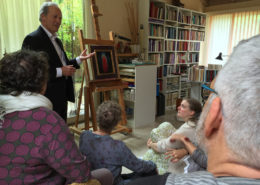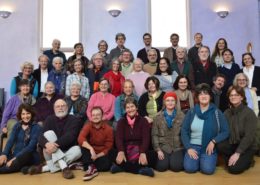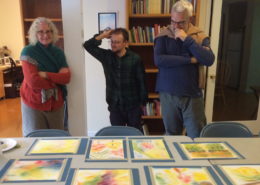Who can become a student at the seminary of The Christian Community?
~ Anyone who wishes to develop skills of observation as a way to knowledge
Those who…
~ Appreciate the wonders of each and every human life-story and the mystery of destiny
~ Wish to attend to the world of the senses, so that eyesight might become heart-sight
~ Search for answers but can also live with unanswered questions
~ Seek a free, original and individual relationship to the Christ, the universal “I” as the door between I and I
~ Dare to ask: Is the spiritual world real? Is the world I live in real? Is there such a thing as building bridges between the visible and the invisible? How can Christianity become ever more inclusive? Am I really heard when I pray? How can prayer become dialogue? Can faith and knowledge be reunited? Is it possible to know what I believe and believe what I have come to know—deeply enough to act on it?
A call to change
At the end of the 19th century, the rebel philosopher Friedrich Nietzsche challenged a hypocritical Christianity that had fallen into worshiping an empty other-worldliness, with no or little regard for the world in which we shape and live our destinies. And in his Thus Spoke Zarathustra, Nietzsche places very provocative thoughts and words into the mouth of the one named after the great Persian initiate who taught his people to turn their gaze toward the earth and cultivate it. Nietzsche’s Zarathustra speaks, I beseech you, my brothers, remain faithful to the earth, and do not believe those who speak to you of otherworldly hopes! … Once the sin against God was the greatest sin; but God died … To sin against the earth is now the most dreadful thing? … Let your spirit and your virtue serve the meaning of the earth, and let the value of all things be positioned newly by you … Verily, the earth shall yet become a place of recovery. And even now a new fragrance surrounds it, bringing salvation and a new hope …
At the beginning of the 20th century, a group of young people, sensing the need for Christianity to change, turned to Rudolf Steiner, whom they had come to trust as a teacher, to ask: Is it possible to renew Christianity—and if so, would you show us the way? This question of the young led to the founding of The Christian Community, Movement for Religious Renewal, in 1922, and the ordination of both men and women.
Today, almost a hundred years later, more and more individuals have awakened to humanity’s responsibility to serve the earth rather than exploit it, to see it as a place in need, with the potential for recovery and new hope.
No longer can we as individuals nor as humanity continue to sin against the earth, for it is on this earth that God took on human form, died on the Cross and rose again. In His deed of suffering, death and resurrection lies the foundation for our potential, with and through Christ, to re-make the earth as a place of recovery and renewal. It requires our remaining faithful as we strive to know the earth as the place of Christ’s Incarnation, to which He united His body with its body in His death, to sow the earth with the potential for recovery, for resurrection.
The task of the priest is to develop eyes for the unseen in what is seen, to act in the material, physical sense-world in harmony with the immaterial and super-sensible and to assist individual human beings in their striving to shape, create and live authentic lives.
The word salvation has its root in the Latin word salve, which means healing, as does the Greek origin of the word sacrament. To heal is to make whole, and thus holy, that is, sacred. In the vocation of priesthood in The Christian Community, we attempt to bring this about through the renewed body of the Seven Sacraments.
By Gisela Wielki
If interested in the vocation of priesthood and the seminary, check out our website:
www.christiancommunityseminary.ca



